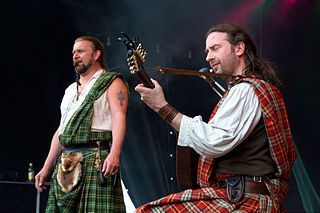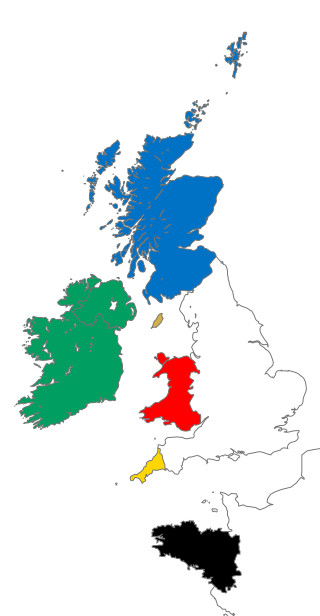
The Brittoniclanguages form one of the two branches of the Insular Celtic language family; the other is Goidelic. It comprises the extant languages Breton, Cornish, and Welsh. The name Brythonic was derived by Welsh Celticist John Rhys from the Welsh word Brython, meaning Ancient Britons as opposed to an Anglo-Saxon or Gael.

Celtic music is a broad grouping of music genres that evolved out of the folk music traditions of the Celtic people of Northwestern Europe. It refers to both orally-transmitted traditional music and recorded music and the styles vary considerably to include everything from traditional music to a wide range of hybrids.

The Celtic languages are a group of related languages descended from Proto-Celtic. They form a branch of the Indo-European language family. The term "Celtic" was first used to describe this language group by Edward Lhuyd in 1707, following Paul-Yves Pezron, who made the explicit link between the Celts described by classical writers and the Welsh and Breton languages.

Tarvos Trigaranus or Taruos Trigaranos is a divine figure who appears on a relief panel of the Pillar of the Boatmen as a bull with three cranes perched on his back. He stands under a tree, and on an adjacent panel, the god Esus is chopping down a tree, possibly a willow, with an axe.

In ancient times, Armorica or Aremorica was a region of Gaul between the Seine and the Loire that includes the Brittany Peninsula, extending inland to an indeterminate point and down the Atlantic Coast.
The Iberian Romance, Ibero-Romance or sometimes Iberian languages are a group of Romance languages that developed on the Iberian Peninsula, an area consisting primarily of Spain, Portugal, Gibraltar, Andorra and southern France. They are today more commonly separated into West Iberian and Occitano-Romance language groups.

The Celtic Revival is a variety of movements and trends in the 19th, 20th and 21st centuries that see a renewed interest in aspects of Celtic culture. Artists and writers drew on the traditions of Gaelic literature, Welsh-language literature, and Celtic art—what historians call insular art. Although the revival was complex and multifaceted, occurring across many fields and in various countries in Northwest Europe, its best known incarnation is probably the Irish Literary Revival. Irish writers including William Butler Yeats, Lady Gregory, "Æ" Russell, Edward Martyn, Alice Milligan and Edward Plunkett stimulated a new appreciation of traditional Irish literature and Irish poetry in the late 19th and early 20th century.
The Celtic calendar is a compilation of pre-Christian Celtic systems of timekeeping, including the Gaulish Coligny calendar, used by Celtic countries to define the beginning and length of the day, the week, the month, the seasons, quarter days, and festivals.
Insular Celtic languages are the group of Celtic languages spoken in Brittany, Great Britain, Ireland, and the Isle of Man. All surviving Celtic languages are in the Insular group, including Breton, which is spoken on continental Europe in Brittany, France. The Continental Celtic languages, although once widely spoken in mainland Europe and in Anatolia, are extinct.
The modern Celts are a related group of ethnicities who share similar Celtic languages, cultures and artistic histories, and who live in or descend from one of the regions on the western extremities of Europe populated by the Celts.

Most of the Portuguese vocabulary comes from Latin because Portuguese is a Romance language.

Pan-Celticism, also known as Celticism or Celtic nationalism is a political, social and cultural movement advocating solidarity and cooperation between Celtic nations and the modern Celts in Northwestern Europe. Some pan-Celtic organisations advocate the Celtic nations seceding from the United Kingdom and France and forming their own separate federal state together, while others simply advocate very close cooperation between independent sovereign Celtic nations, in the form of Breton, Cornish, Irish, Manx, Scottish, and Welsh nationalism.
Alan is a masculine given name in the English and Breton languages. Its surname form is Aland.

The Celtic nations or Celtic countries are a cultural area and collection of geographical regions in Northwestern Europe where the Celtic languages and cultural traits have survived. The term nation is used in its original sense to mean a people who share a common identity and culture and are identified with a traditional territory.
French is a Romance language that specifically is classified under the Gallo-Romance languages.

Celtic toponymy is the study of place names wholly or partially of Celtic origin. These names are found throughout continental Europe, Britain, Ireland, Anatolia and, latterly, through various other parts of the globe not originally occupied by Celts.
Common Brittonic, also known as British, Common Brythonic, or Proto-Brittonic, was a Celtic language spoken in Britain and Brittany.









